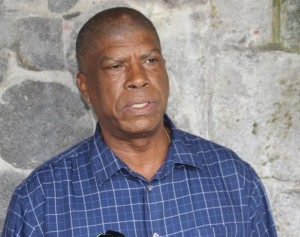
Discussions between Dominica’s sole electricity company, DOMLEC, and the Independent Regulatory Commission (IRC) regarding electricity rates for the next three years should be over by August.
On Tuesday the IRC, DOMLEC and other stakeholders held a public consultation on the matter and IRC Regulations Manager, Francis Paul, said a decision will soon be made.
“We expect, say by August 2015, we should have firm word as to where it heads,” he stated.
Paul explained that Weighted Average Cost of Capital (WACC) is what determines the financing DOMLEC gets and what will be the return. WAAC is the average rate of return a company expects to compensate all its different investors. The weights are the fraction of each financing source in the company’s target capital structure.
“So this would have an impact on rates and that is the important time for most stakeholders to come and give their views on the WACC itself,” Paul explained.
He informed that on the 23rd of April the Commission will be making a decision on the WACC and DOMLEC has to formally apply for rate review and “when we have all the information necessary then you will get new rates.”
But he added that “we cannot say now is which side it will take.”
According to him, a consultation was already held on the WACC, DOMLEC’s Integrated Resource Plan (IRP) and its five-year investment plan, however a few issues have surfaced.
Some of these issues was switching from Eastern Caribbean Stock Market, where data was derived to the more “mature” US market.
Another issue Paul pointed to was weights. He explained that weights are determined when the market value of debt and the market value of equity are added together and the proportion of debt to equity is received.
He noted that on one hand DOMLEC is proposing a debt to equity ratio of 33.1 per cent to 66.9 per cent but the IRC was proposing 38 percent to 62 percent.
“What we see over the years is that the equity of DOMLEC has been rising and if you take these types of ratios it means that the cost of equity becomes more expensive. So if equity becomes more expensive, it is going to be a burden on the rate payer. So what we are trying to do is to address that situation from now,” he pointed out.
Paul added that all comments that were made during a consultation last month were taken into consideration and it is reflected in the new document issued for the consultation on Tuesday.
Meantime he is describing relations between DOMELC and the IRC as “fairly good.”
“So we don’t always agree but we have had a fairly good relationship,” Paul said.

I have two questions.
Do people businesses, who apply for a standby generator have to pay a license fee and if yes, how much is it?
Do people?businesses, who have their own generator have to pay vat on the electricity they produce? Thank you.
That thing Domlec needs to be nationalized, then partly subsided whether in reduced vat, concessions to businesses to encourage new businesses to set up shop here etc. It would be a win win for Dominica. So I suggest stop building walls for a year or two and get funding to buy it back. IRC sounds irrelevant, any gov’t department can do that without much additional overhead.
DNO,
I believe there is scope for further breaking down some of the terms here such as the WACC so that all readers can understand the essence of the story.
Government should nationalize Domlec period!!!
IRC is a waste of time they are just like the daic… kosonee
PS. The IRC is not truly independent and out of necessity rows the govt’s boat.
First of all I would argue that equity is not an expense but an asset. However there are other, major cost factors that determine the size of our electricity bill and which in my estimation have never been challenged by the IRC,:
– the rate of VAT (15%), which effectively means that the govt. can generate more revenue through this source alone than Domlec does out of its guaranteed 15% profits. In many developed countries vat on electricity is levied at a much reduced level. I have never heard IRC tackle the govt. on this.
– the cost of diesel charged to Domlec. Again, the govt. is the main beneficiary of profits generated form the sale of diesel fuel. Why hasn’t IRC questioned these profits?
– the cost of the IRC itself, a govt. body, which in my estimation is in excess of E.C.1.5 million a year and contributes directly to the price we pay for our electricity.
I’m neither a shareholder nor a friend of Domlec but the IRC is not independent and out of necessity rows the…
Malgraysa, those three bullet points are very sage observations. Domlec provides major revenue to government thought VAT, Corporate taxes paid, Excise tax paid on fuel and the additional 5% levy that government imposes on fuel. A good honest conversation about how these taxes and charges affects our final electricity bill is necessary. For example in St. Kitts VAT is not charged on Electricity. That is not to say that Domlec should not pay its fair share of taxes, but it would be useful to know how those taxes affects my monthly electric bill.